Danny Wilding - Breathing Melodies
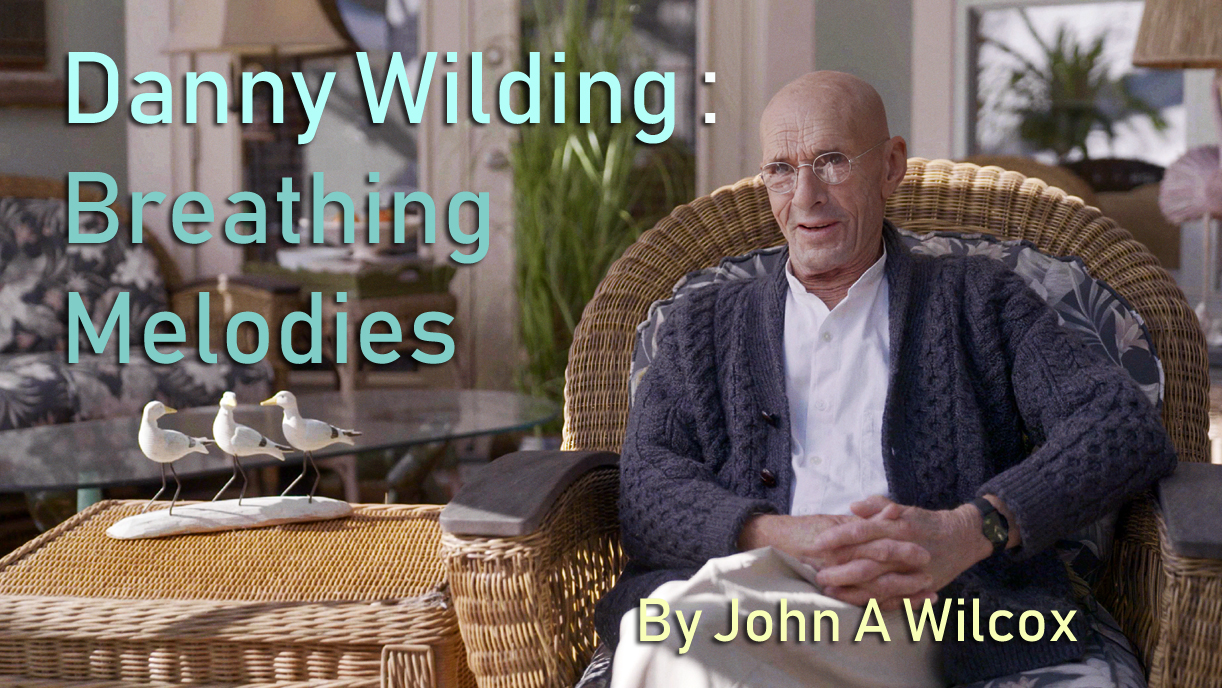
by John A. Wilcox
To the best of my recollection I first met Danny Wilding in 1984/85 in Stamford, Connecticut through a mutual friend. Wilding is an immensely creative guy with a quick, wry wit. Most know him for the 1978 album Pleasure Signals which he did in collaboration with guitarist Pete Bonus and a superstar cast of supporting players. Recently we decided to bat an interview back & forth and the results pulse on your trembling screen! Do join us...
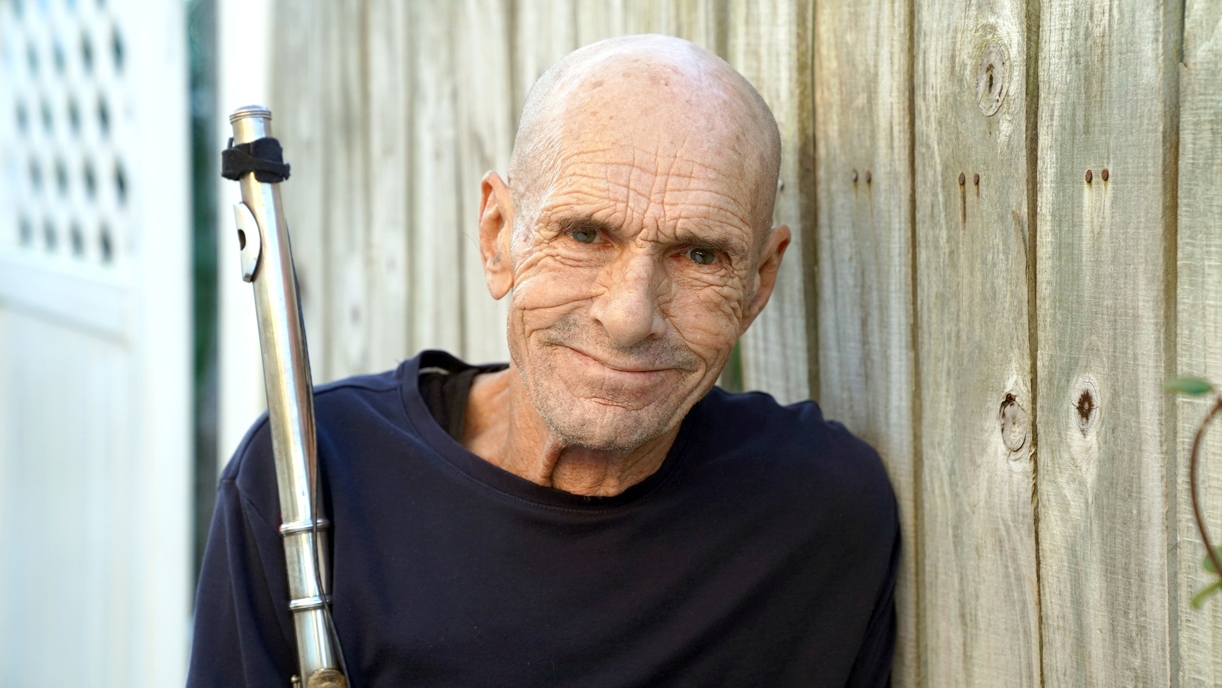
PS: Where were you born?
DW: I was born by†a river in a little tent. Seriously, I was born in a small hamlet called Kinson, bordering the southern edge of the New Forest in England, my magical kingdom as a child, bestowed as I was with a huge imagination. In the forest I could be a King, a cowboy, a highwayman etc - wonderful childhood.
I avoided school as much as possible, hopping on my bike, buying two pennies worth of stale cakes and journeying to the heart of the largest forest in Great Britain. I was a strange child. I liked being on my own. I've never fathomed how at the age of 5, I packed a small cardboard suitcase and left home. I guess they found me about a mile away dragging that old case.
PS: Do you come from a creative family?
DW: My father was a wonderful illustrator and calligrapher, my mother a poetess. One of my favourite memories is of my mother reciting wonderful poems to me in the kitchen. My sister takes after my father and paints. After I moved to the States these wonderful letters would arrive with the address scribed with the most beautiful calligraphy and with a painting on both sides of the envelope. Creative folks.
They were really supportive of me and my love of music, letting me go to bed with the transistor radio, listening to Radio Caroline and Radio Luxembourg When I was 14, I saw an ad in the Melody Maker for the Brigade of Guards Music School and my dad took me to London to audition and I got in. They were very supportive, although later on, they started to change their minds a bit when I got to New York and had my first semi-hit. Can you imagine their son running around the world with a naked woman under his arm, playing music and enjoying the excesses that the music industry could provide? They weren't best pleased anymore.( Allow me the opportunity to explain the 'naked women comment' I had found a photographer in London named Peter Barry who had the most remarkable piece of art depicting a desert scene by overlaying a nude model on the art board until it truly looked like a desert.) Check it out on my website if you can, it's very tasteful and brought me the attention I sought, shocking the lookers and causing waves.
PS: How old were you when you first picked up a flute & why?
DW: I started playing a Bb flute in a fife and drum band in my tenure as a Grenadier Guardsman; of course always making up alternate melodies to everything we played, on the spot. Later, during the English Explosion, I was a stage manager putting on rock concerts in London and got caught up in the fervor of the moment, purchased a concert flute and took off to the marshlands and tried to teach myself this over-sensitive instrument. In the end I drove everybody nuts with all the squeaks and shrill trills that I was banished from my home. I moved into the old stables out back and continued to offend only my ears. This all happened before I reached 25.
I decided to initially pick up the Bb flute because I thought that was the easiest way of getting into the Reconnaissance Platoon, which was as far as I was concerned, the cream of the regiment. After I left the army a few years later and was stage-managing, I actually bought a bass guitar and all the gear that goes with it. Unfortunately, I didn't get along with it and ended up selling everything 3 weeks later and buying the beautiful aforementioned concert flute and the rest is history. Also I love the timbre and depth of the alto but alas the work involved is immense. Trying to record the alto is difficult, you're one thin low note playing against 20 to 30 other notes from your backing track or even worse an orchestra, I can barely hear myself.
PS: When & why did you decide you wanted to pursue the flute professionally?
DW: A short year later, I had left my stage manager's job and became a delivery driver at Island Records. Most days I would end up talking to the owner, Dave Betteridge, and I would keep him up to date on my flute playing and my experiences playing out and around in London. He must have been intrigued by me because after about 6 months, he offered me a job as an A&R man for the label, which I grabbed with both hands. I continued to play the flute as before, playing with other musicians and bands and bringing them into the studio to record and hopefully start their own musical careers. Before long, I had found myself in the studio with a young drummer by the name of Phil Collins. We ended up in the Who's studio playing what now would be described as World Music with Collins on piano. That little demo along with a piece I had produced with Rob Lumley were my introduction to a record company in the USA (Jem Records) that eventually resulted in my moving there permanently.
I realized that I wanted a career playing the flute upon listening back to those simple piano/flute compositions that I recorded at Ramport in London. We pretty much made it up as we went along; Collins playing piano and bells etc and me adding all kinds of sounds with an electric flute synth that a friend had invented. I liked what I heard and realized that writing and recording wasn't the big scary monster I would have thought. I didn't really make a conscience decision to make music a career, I just slid gently into it.
One of my first realizations that helped me decide I wanted a career in music was that I was seeing how fresh and exciting the industry was. I witnessed Richard Branson selling new and used vinyl on Portabello Road, which ended up being one of his first steps in creating his Virgin empire; and Betteridge and Chris Blackwell selling Millie's My Boy Lollipop out of the back of their car on housing estates around London, which was how Island Records began. They were ground breaking and innovative entrepreneurs and I wanted to be a part of it.
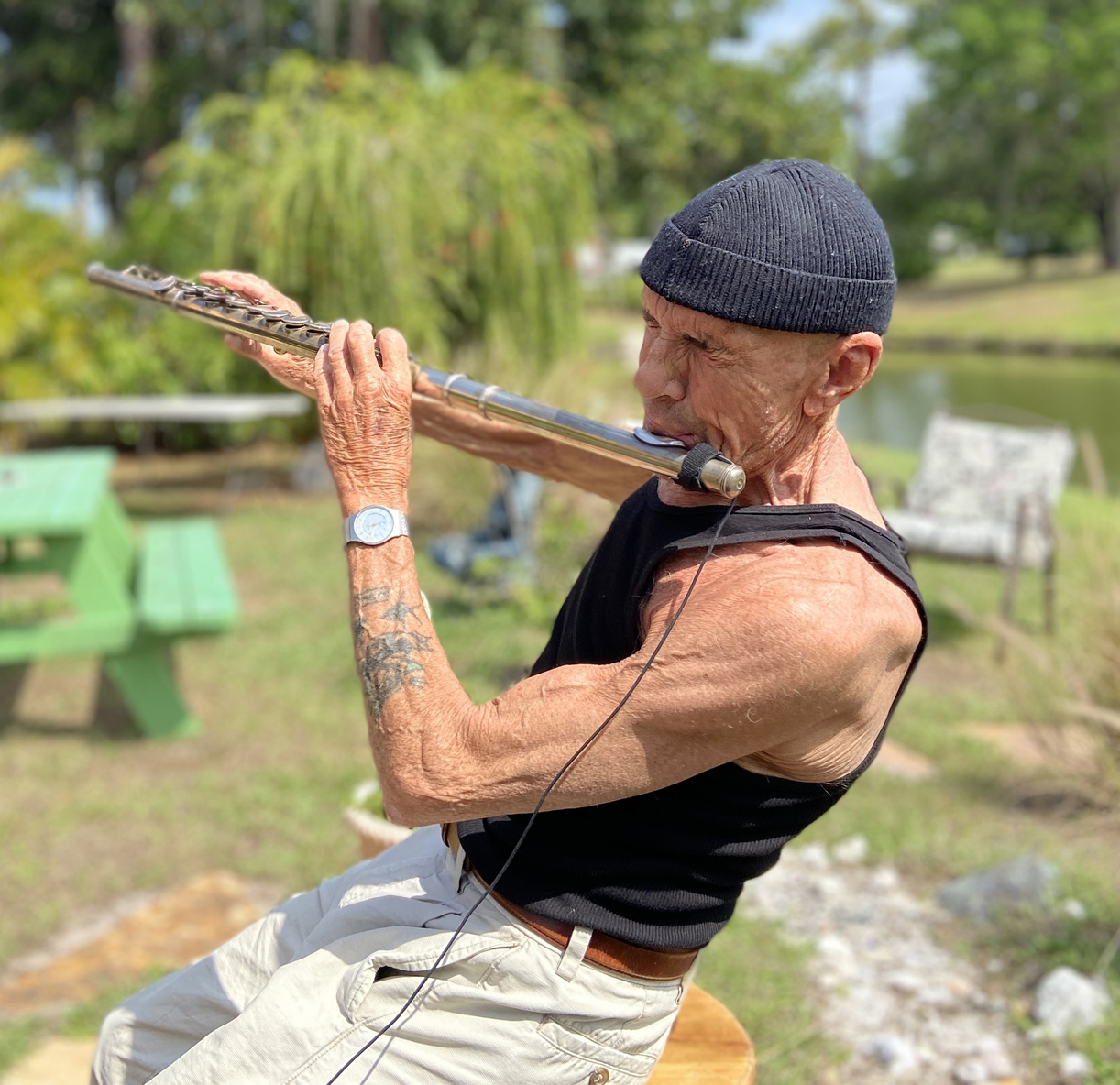
PS: What was the very first recording your playing appeared on?
DW: My own actually. The aforementioned calm ethereal composition that I had recorded with Collins I repeated the following week with Robin Lumley at Trident studios.†I used these compositions as a calling card to producers in New York when looking for documentary/advertising work. This of course was a different genre of music compared to Pleasure Signals released around the same time. Pleasure Signals was the result of working with Peter Bonus from Brand X, recording with him. These were my very first recordings and I already felt pretty confident in my playing, knowing of course that I could learn a lot more.
PS: How did you become involved with Island Records?
DW: Well I've been over that in question 4. The A&R job came with extremely low wages and an even lower expense account, but a man such as David made sure I had a big new shiny car. As for the expense account was concerned, it covered my clothes bill at Oxfam (the British version of Goodwill). What an experience it was, to be able to go anywhere in England, find a promising young band and record a demo for them in London. †Great times, and I haven't really been the same since.
PS: What do you see as your highlights working there & what did you learn most from the experience?
DW: The highlights of my time at Island Records would have to be the successful formation of Brand X and picking up the The Little River Band. Island, of course, didn't pick up on either band, but of course musical history was made by both. Up until then, I had never failed at anything in life so it came as a shock to me that my take on both bands becoming successful was rejected. The events happened so quickly. I was introduced to Barry Earle from a band called Mississippi and what I heard was excellent. I showcased them at the Speakeasy and after nothing but great feedback from all and sundry I thought I had picked up my first Island band, only to have the two entities not be able to agree over 2,000 pounds. Consequently, the band picked up and packed up and left London, changed names, and went on to a slew of number 1 singles under the name Little River Band, all within a couple of months. I was devastated. I knew that I could spot or simply nurture a hit band, so I dragged my tail out of Island and left.
Another highlight of my tenure at Island was meeting Peter Bonus - to my mind the only man at the studios who could write instrumental melodic themes. I didn't, at that time, have that ability to write a proper hit melody, so I ended up partnering with Peter and recording the first three tracks of Pleasure Signals, which were also rejected. I was learning that fast, musical freedom was not to be found in the UK for me, personally, and to this day I still have a problem with a guy dressed in a suit behind a desk, yanking my emotional barometer up and down. Not one word or action taken by the music industry toward me ever turned out to be the truth in the UK. I am at least not bitter or sad about the business side of my life. †I made up for it by playing sax/flute with a 14 piece African band called Ginger Johnson's African drummers. How can one not be affected by 6 conga players, playing behind you, with the vibrations resonating through your body? I also sat in with Brand X at Crystal Palace playing horn and also had a scratch band called Zox and the Radar Boys with Collins. In the back of my head continuously was the lure of the USA, so with the help of a wonderful gentleman by the name of Jeremy at Electric Records I crossed the pond. I did a lot of learning about human nature and it's light and dark agendas. By that I mean I was becoming more aware of life with all of it's unfulfilled promises and expectations. Little did I realize at the time but my faith was just starting to grow; probably as I had nowhere else to turn and nowhere else to go.
PS: How did you meet Pete Bonus?
DW: Richard Williams, my A&R partner, was approached by Brand X, and after a bit of back and forth, ended up playing
in one of the rehearsal rooms at Island. He spoke very highly of them and told me to go check them out, which I did. Pete Bonus was one of the two guitar players in the band, alongside John Goodsall, and I introduced myself to them. I developed a strong relationship and bond with the band, but most of all with Peter. To hook up with this guy was the cream on top of the cake for me. He restored the faith that I had in my playing and writing and made light of every serious situation that I was experiencing, bringing a beauty and lightness into my life. He was a true inspiration.
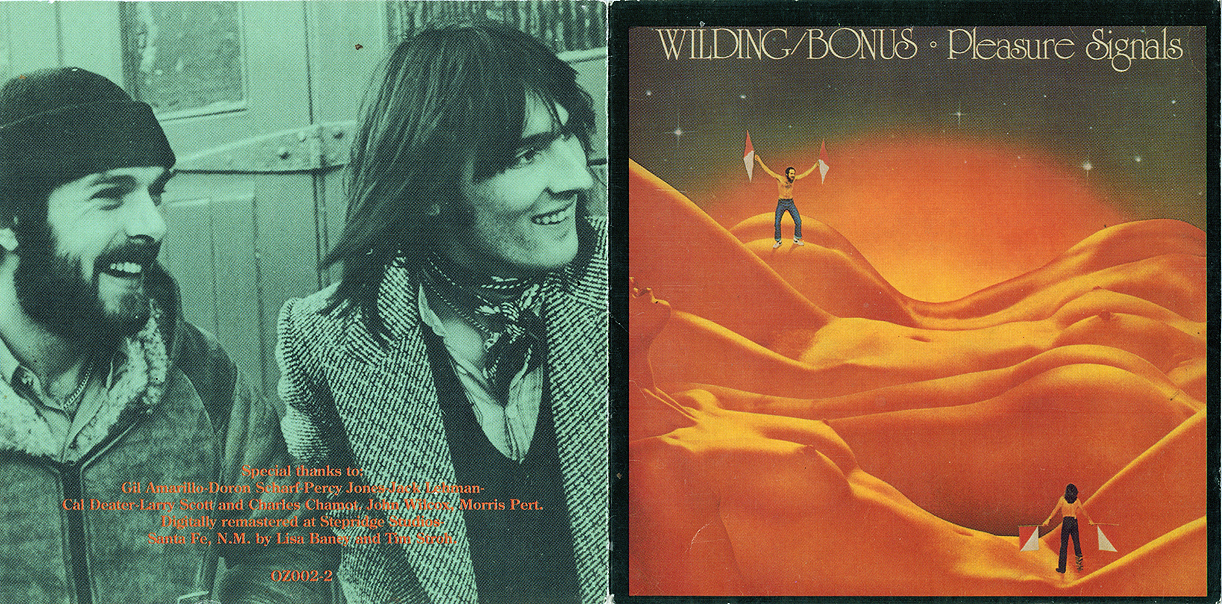
PS: What songs do you feel are the strongest on Pleasure Signals?
DW: It's difficult to grade your own work, and I'm immensely proud of that record, but I do have a few tracks that stand out for me.
I love Race For Space. Peter, in his worldly wisdom, named it that as there wasn't any room for overdubs. The song is packed. It's fully arranged. It's great.
Rampage is worth a mention as well. It was the first time I had recorded using my electric flute system, so that theme is a flute played through a 'Wah' pedal. This was the last track we recorded at Island, and it actually presented a problem, as I had one track and two drummers - Mike Shrieve and Phil Collins. Trying to accommodate both players, I decided it would be fun to split the track in two, putting Collins on the front half and Shrieve on the back half and it actually turned out great! I don't think the two gentleman concerned were that happy, but such is life.
Lastly, I still have a preference for G Storm. I think I was at the top of my form when I wrote that melody. I later partnered up with an arranger by the name of Jeff Jolly and transposed it into march time and recorded it using the band at University of New Mexico. I'm currently looking for a publisher so that it can end up as sheet music and be played globally and have renamed this new version The Colours. It's a very stirring and happy piece.
PS: How did Rebop Kwaku Baah become involved with the album?
DW: Rebop was hanging around Island Studios, as we had a couple of rehearsal rooms as well as the studios, so that Island bands could rehearse and record in the same facility. His band, Traffic, were working there and Pete ran into him. Anyway, Pete edited a solo timbale onto a track entitled Visions Of Africa. Plus, we had him record on Race For Space. He, of course, was friendly with Ginger Johnson's African Drummers, and I sat in with the outfit and their 6 conga players for a while. I was the token white guy in the band and I had no complaints. There were a slew of great African and Jamaican musicians hanging around Island Records in those days. There were 3 to 4 bands a day, recording and rehearsing in the same small complex, and chances were that if you hung around long enough, you'd get a gig, or at least sit in with bona fide musos.
PS: What was your experience like working with Passport records?
DW: I've no complaints to make about Passport. They gave me my break in America when I was an unknown artist with 3 demo tracks in my back pocket and a bunch of interesting friends. Luckily for me, they went with their gut feeling and signed me. I had originally met their CEO in London and he had shown an interest. That was enough for me and it took me a week to pack my belongings and say adios to the homeland, I arrived in New York with a couple of dollars and a bag full of dreams. I touched base with Passport and managed to conclude a deal. I was in? or so I thought.
We released Pleasure Signals, which I'm proud to say made me their top seller, and 6 months later, I was pleasantly surprised that when the picture disc era came along, they jumped on the wagon and pressed a few thousand copies. A long time supporter recently acquired a mint condition copy unopened and presented it to me. What a beautiful thought.
When it came time to re-sign, Passport had earmarked their whole budget to the disco market that was raging at the time. In retrospect I should have gotten hold of some disco backing tracks and played some wild flute over them. Regardless, I was angry with them and even went as far as to contact a lawyer. I didn't get anywhere with it, of course. I do look back at my time with them fondly, the only sour note coming when they decided to move in a difference direction and left me behind.
I ended up speaking to various other record labels, all of whom deciding to pass on me too. It demoralized me and I decided to move on to the next chapter of my life, moving to New Mexico and starting in the film business.
As far as record companies are concerned, and now in the present, after almost 40 years of looking in from the outside, I think their demise would give us some cleaner air. I mean come on, how much are the younger artists making on this streaming/downloading fiasco, having to give their record label the lion's share of any and all sales and royalties. One thing's for sure: The rewards will barely feed you and your family, and that's if you can even afford a family. What a beautiful art form that looks so pretty when you look at the wrapping, but inside the package is a scenario akin to a minor war zone.
It came to me that there are at least 30 leading musicians, all with excess of $200 million each. Why can't they each pitch in with, say, half a million each and form a solid, honest, non-profit for all musicians and composers that would distribute their work for a reasonable royalty? With writers unable to support themselves, who is going to physically write music? Something has to be done, and to say the least, they can.
PS: Did Pleasure Signals make the splash you were hoping for?
DW: Short answer? Yes. Long answer? Yes, absolutely. I believe it sold very well, which was obviously important (the exact figures elude me now), but when I came to America, I was hoping that the record would put me on the map, so to speak, and it did exactly that. I wanted to tour the album but when I went to the airport to pick up my gear after it was sent back the US from England, where we recorded the album, everything in the flight case had been destroyed! The airline's security must have thought that this admittedly crazy looking pedal board must have been some sort of explosive device or something. So, instead of making a couple simple phone calls to find out what was in they case, they decided to just shred every single wire and destroy everything inside. It was heartbreaking, and meant that I wasn't going to be able to recreate the album live. All this beautiful one-of-a-kind handmade equipment, which took years to build, was gone. Instead, to promote the album, I did many radio interviews all along the North-East coast of the country. It was fabulous. One of my most cherished memories was when I had found out that Alison Steel (The Nightbird) was going to play one of my songs on WNEW at midnight on her show. She was the Howard Stern of her time, so a really big deal. The reception in my apartment was terrible, so that night Larry Scott (my agent) and I, dragged our boombox up to the top of Mount Ivy, about 40 miles North of New York City, and when she came on, just as promised, she introduced the song and me, and G Storm started playing. At that very moment, I didn't just feel like I was on top of Mount Ivy; I felt like I was on top of the world. Another large notch on my belt came soon after. I had given New York DJ, Sammy Vargas, my album. He, in turn, helped it along and into the hands of the music publication Record World, another very big deal at the time. That same summer, they named me the 5th best flautist in the world! How could it get any better than this?
Unfortunately, as I have already detailed, Pleasure Signals would end up being my only release during my time in the North East, and after the sequence of events that would ensue, life led me down to New Mexico and the start of a wonderful new set of adventures, both in music and in film.
It was an amazing feeling to be in the desert and it instantly truly felt like home. The excesses of New York were behind me and I could finally move forward once again. I could of course write a small book on my life and adventures in New Mexico and I'll only touch upon one subject. The Movies. As Hollywood discovered the advantages in 1990 of filming there I had the opportunity to start a security company only to be employed by Hollywood. Well after 18 years and 44 movies later I had a yearning to play again, I hadn't quit my charity work which at times was draining but I started to write and record again which led me to the present. As far as the movies were concerned I realize now that I had never had so much fun in my life. Of course whilst on the shows I would play for the cast and crew which over the years became a little tradition whipping out a tune for mealtimes or breaks in filming and visiting dignitaries etc.
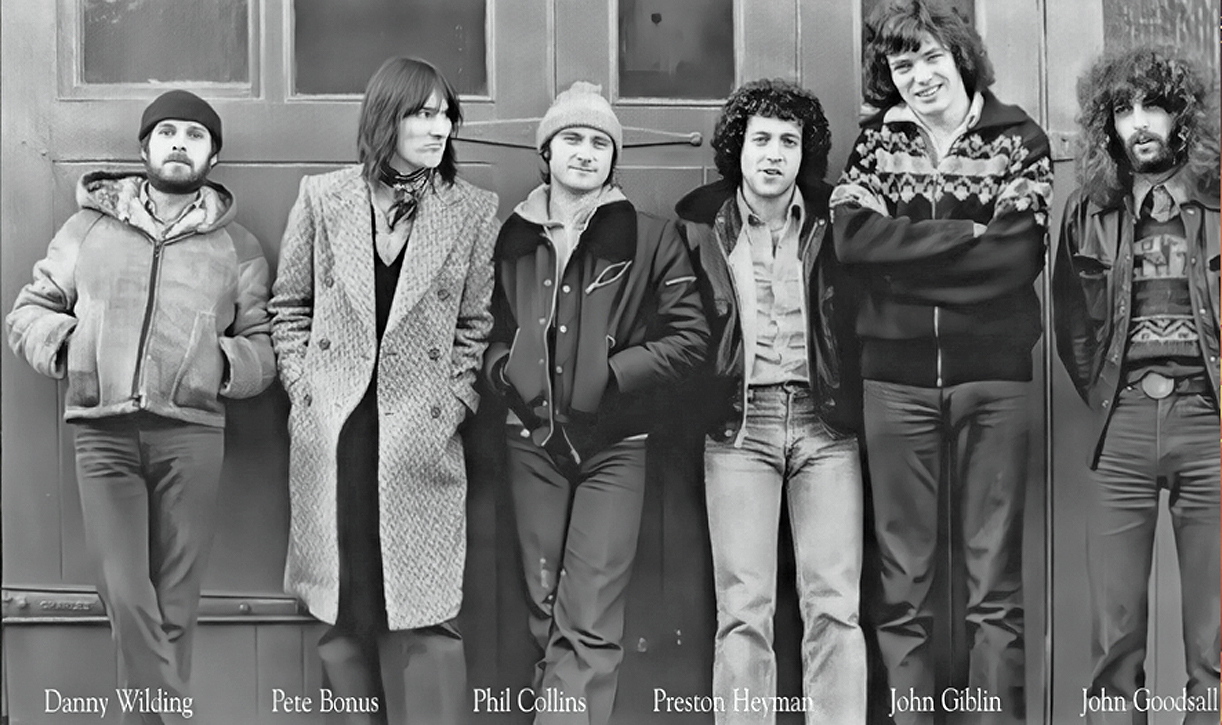
PS: In terms of the flute, how has your approach to breathing changed over the years?
DW: When I was a young flute player and had all these Ďbeginnerí questions, I discovered a form of breathing associated with yoga. You start by inhaling, first filling the tummy with air, noticeably expanding the tummy area. You then fill the main area of the lungs, expanding the rib cage, before finally pushing your shoulders back a little and filling the very top of your lungs. To exhale, you basically do it in reverse. You push out the air in the main chest cavity first, before emptying out the air in your tummy portion by squeezing the abdomen and expelling the rest. By keeping the abdomen under constant pressure as you exhale, it gives you tremendous control over the air as is passes through your lips and into the flute, resulting in the most powerful or delicate notes coming through the flute. This also allows me to bend notes, which not a lot of flute players are able to do. I have practiced this type of breathing for decades as it has served me very well. I havenít looked to change it, because it has been so successful for me. Instead, I have just tried to control it better, and to be as proficient at it as possible.
PS: How has spirituality affected your approach playing and writing?
DW: Aha the million dollar question! My spiritual life, my performance and my writing co exist. They're all wrapped up in the same package . Of course leading or trying to lead a spiritual life has landed me in all kinds of places.
From performances in cathedrals to little village churches, prisons, hospitals, therapy groups, movie sets, heartbreaking funerals, drug and alcohol centers, the homeless and a thousand other settings where I'm hoping to make a difference to the mind, always trying be there to calm the turmoil and unpleasant drama one encounters on this mud ball we live on. I've had experiences that one would find hard to believe for instance I played a funeral way out in the mountains and as I was playing a meditation the spirit upped out of the grave and shot up in the air right in front of me or once I was playing in a small stadium for a spiritual event when out of my monitors human screaming erupted How about this one I started playing in a small village church in New Mexico with a couple of guitar player buddies of mine Tom and Steve plus an array of older ladies whose vocal talents were very suspect but from the first hymn I can only say that the holy spirit came aboard and turned that choir loft into a first class performance. I have played everywhere as you can imagine for all kinds of different persons ,groups,occasions,etc always aware of my own spiritual feelings,beliefs and devotion Without a spiritual path I don't know if I could of pulled some of the more challenging performances off. That I believe is the spiritual connection between my Alto flute and my faith.
PS: What do you feel has remained a constant in your work over the decades?
DW: From a technical standpoint, one thing I feel has been a constant in my playing / work is something I like to refer to as ďthe stripping of the noteĒ. What I mean by that is, whilst doing exercises - scales, breathing techniques, writing or rehearsing - I will end up playing that note every way I can. I will bend it, trill it, sing it into the flute etc. This, I hope, has given me a wide variety of tonal and musical colors to play with, and express myself with through my flute playing.
From a musical perspective I have always been keen on melody. From a very young age, and we havenít even touched on this yet, but my first instrument was actually the violin. There I was, playing 3rd violin in the Junior Bournemouth Orchestra at the age of 7, sitting as far back as you can go, searching for melodies on the violin, completely shunning my parts on the sheet music in front of me. I would just hear an alternate melody and I would explore it. I was only able to get away with this because I had enough other musicians obeying their sheet music around me that my playing of different parts or melodies wasnít too noticeable.
This love for melodic exploration stayed with me all the way until I left the orchestra at age 14 and auditioned for the Grenadier Guards, still playing the violin. To my surprise, I passed the audition and they let me in! I didnít think I was all that good, quite frankly, so I was pleased to have successfully got it.
Whatís funny is, I brought the same approach I had in the orchestra with me to playing with the Grenadier Guards, constantly going against instruction and just searching for that melody that would fulfill me, spiritually and artistically. Iím not sure how I got away with it all without being reprimanded, to be honest, as you canít go rogue and just play whatever you want when youíre performing outside of Buckingham Palace!
Unfortunately, it wasnít meant to be. After about 6 months, I got into a fight with someone in the Guards and smashed my violin over his head. I donít remember what the issue was, but he clearly pissed me off and tipped me over the edge. Whatís worse is that the violin that I shattered over his skull was actually leant to me by the Guards. Technically, it was government property and my actions werenít looked upon kindly. The higher ups moved me along and I joined the Junior Leaders, another division within the Guards, and their Fife and Drum band. Thatís where I picked up the flute for the first time.
Playing the flute, I finally felt like I had found my calling. I just felt it. With this instrument, youíre only able to play a single solitary note, and that appealed to me even more. You either play your single notes, woven into the tapestry of an instrumental, or you take the lead and you let the flute shine. My choice was always the latter. My focus from then on was to always find the melody. I looked for beautiful, memorable, and repeatable motifs that would you could use in music that conform to typical, Western, popular music standards and norms. This is something I still do to this day. I will play a backing track on the computer and sit there, searching for and writing beautiful melodies. The true acid test then always arrives when I play my pieces to friends and family and I see their reactions, and you wouldnít believe how many people actually shed tears when I perform. Thereís a video on YouTube of me performing at the James A. Little Theatre in Santa Fe, NM, and I just remember looking down at the audience in the front row. Every single one of them were either smiling or crying. It was incredible. Is it the melody that elicits this response? Is it my enunciation of the notes? Is it simply the sound of the flute? Is there something more to it? I donít know. Maybe itís a combination of it all, but somehow, what Iím doing touches them, so Iím in no hurry to change what Iím doing.
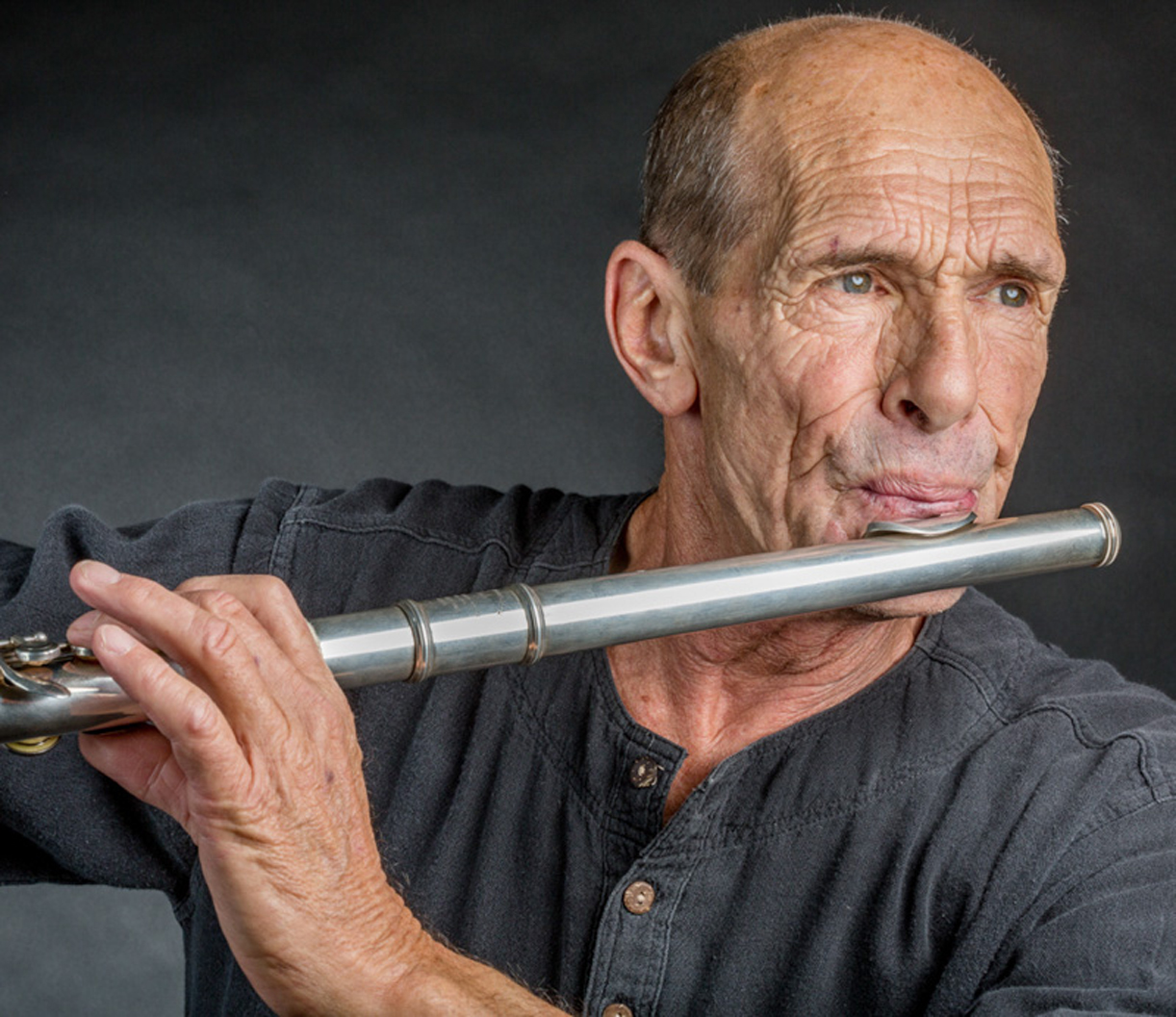
PS: What have you not tapped into yet, musically, that you would like to try?
DW: I have this idea. I want do an album consisting of the most intimate and vulnerable; softest and most beautiful ďflute musicĒ yet. I want you hear an open honesty in my playing and in the rest of the music that touches the listener deeply and holds their hand on a journey that only sound and music can take them on. This wonít be a ďlook at meĒ type of project where I show off my technical flute-playing prowess. Instead, my plan is to take a rather more naked, Ďless is moreí approach, warts and all. Ultimately, as an artist, the goal is self-fulfillment and at this stage of my career and life, I think it would be foolish of me to chase anything else.
Once this project is complete, my goal is to take the album and tour China with it. The flute is so much more popular over there than on our shores and I believe it would be a great opportunity to play in front of different crowds and a different culture again. Iím not going to call this opportunity a ďlast hurrahĒ, but I am fully aware that I wonít be able to play the flute forever, so I am of the mindset that you have to take every opportunity presented to you before it disappears.
However, in the mean time, I still have another project in the pipeline that I am equally excited about finishing over the coming months. It could be considered a little more traditional if compared to my idea above, but look out for an album titled Solo Alto to be released over the coming years.
PS: What are you up to now?
DW: A couple of years ago I ran into a brilliant young British engineer by the name of Richard Skopnik, who resides close by me in northern Florida. He recently completed a huge task for me ie.tying up on all my loose ends, mixing and recording a bunch of little bits and pieces and generally gussying up my whole catalogue of 41 flute melodies. When all that was done, he ensured that for the first time ever, my entire catalogue was available online, placing them on a multitude of platforms to be reviewed, downloaded and streamed (iTunes, Spotify, YouTube Music, Bandcamp etc). He also preps me for live performances by reviewing and editing my backing tracks. This great soul pulls a lot of rabbits out of the same hat and then he also developed my website Dannywilding.net, which Iím also incredibly proud of. The next rabbit is editing my communication, and I do a fair bit of writing. So, having him around to rephrase or rewrite things has been invaluable.
Iím not ashamed to admit this, but in my old age, I have some old fashioned ideas. Richard will listen to them and bring me up to date on the way certain things have changed and how to maybe move forward with them in the most efficient and effective way possible. Plus, as a solo artist, it can get a little lonesome out there, with nobody to shoot your ideas by and no constructive criticism etc so, having him around has been a blessing on many levels. Anyway, enough good said about the man, but it would be impossible to move forward without him.
Currently, we are presenting a march called The Colours to the two top marching bands in the world. Between arranger Jeff Jolly and myself, we transposed the semi-semi hit from Pleasure Signals called G Storm from a fusion piece into a rousing march. It has the support of Jerry Fried (Star Trek, Roots etc) and I need to find it a good home (Publisher). We are also recording three new tracks to complete the new album - Solo Alto. Then it will be on to my Ďpiece de la resistanceí, which I touched on earlier in the interview - a piece that will elevate your whole psyche onto another level.
We also recently hosted the French director Sylvain Despretz, who is currently filming a feature length documentary entitled Brand X: The Desert Years. I was there at Brand-Xís inception in 1975, and along with others, guided them through their first six months together at Island Records. For the film, we did a lengthy interview and a little playing. I wish Sylvain and his project all the success in the world, and if his film making is as creative and wonderful as his storyboard artistry for the likes of Ridley Scott etc. it should more than turn up trumps! On another note, I have an unquenchable thirst to play in China. With a love of the alto flute and a population of one and a half billion, what am I doing here and not there? Sometimes I feel like Iím just playing to the wind here. I long to delight and excite an audience again, not only with my recordings but as a performer. Playing for a society that loves the sound of the alto, Iím sure would have a profound effect upon my playing and the emotions I lean on to form those sacred notes.
The only other thing I pay attention to is keeping fit and healthy. Thereís no way youíre going to hold that three pound silver tube horizontal to your body and blow into a little hole without some strength.
PS: What are your 5 favorite tracks from your repertoire?
DW: Picture this: itís Christmas. Iím shuffling down an alleyway in Key West, listening to the wind and the waves, when out of nowhere comes the sound of a flute with an orchestral type of backing track behind itÖ I peer around the corner and thereís a guy playing a hand made wooden flute into a microphone that heís powering from two car batteries, that he had welded onto the back of a three wheeler bicycle. The sound was beautiful, and out of equal part curiosity and amazement, I approached him about it. His name was Shawn Ruje, a little 5 foot-something fella from eastern Europe. To begin with, he wasnít overtly friendly, but he fascinated me. Meeting him forced me to change my plans and I ended up staying a few days extra and playing with him.
As I was leaving the Island, he said ďYou want some backing tracks?Ē in his thick, Baltic accent. I came back the following day and he hands me an old iPod with literally hundreds of backing tracks on it that he had created on his computer. Absolute genius.
The first track Iíve chosen is called Sword, the backing track of which came off of that very iPod. I wrote the melody in Florida and recorded it in the wilds of New Mexico. It has that haunting sound one would acquaint with the canyons and the wind. Iíve spent a good deal of my life in those canyons and it seemed fitting to put the track together in that way.
The second track is called Borrowed, which, funnily enough, is how I acquired the backing track in the first place. I had loved Patrick Bernard's album Solaris Universalis and was always humming a counter melody whilst playing it. Well, one melody got stuck in my head so, again in New Mexico, I recorded a new melody, sending it off to Patrick for approval and permission to use. He loved my take on his piece, and now I hope you do too.
Third is Race For Space - a title named not for extraterrestrial activity, but simply because there wasnít any more room for overdubs! You see, thatís the beauty of writing instrumental music. You can name your songs anything you want because there are no lyrics to push your naming of said tracks in any directionÖ What a rhythm section though: Phil Chen on bass, Collins on drums and Rebop Kwaku Baah on congas. The excitement generated during those sessions at Island was electric and unprecedented, and everyone had a great time on the project.
On to the fourth track: G Storm. I wrote this in New York, envisioning a world where gravity ceased to exist. Again, another exciting rhythm track; Collins again on drums joined by John Giblin on bass and the late John Goodsall on guitar. John passed away in Minnesota and, of all people, Sylvain - the aforementioned director working on their documentary - flew in from Paris, picked up his ashes, and then flew onto LA to deliver them to Johns family. Nice work Sylvain.
Lastly, Iíve also included a fifth track, called The Colours. itís the march version of G Storm, the previous track already on this list. Perhaps, if so inclined and just for fun, the reader could do a comparison. Well, I hope Iíve answered all the questions in an interesting manner. I realize that Iíve led a very exciting and fulfilling life, but rereading this article, there does appear to be one thing missing, and that is the humour and the laughs, of which there has been an abundance! I donít see that aspect shining through in this interview, and I still have a million little stories to tell. Maybe I should write a book.
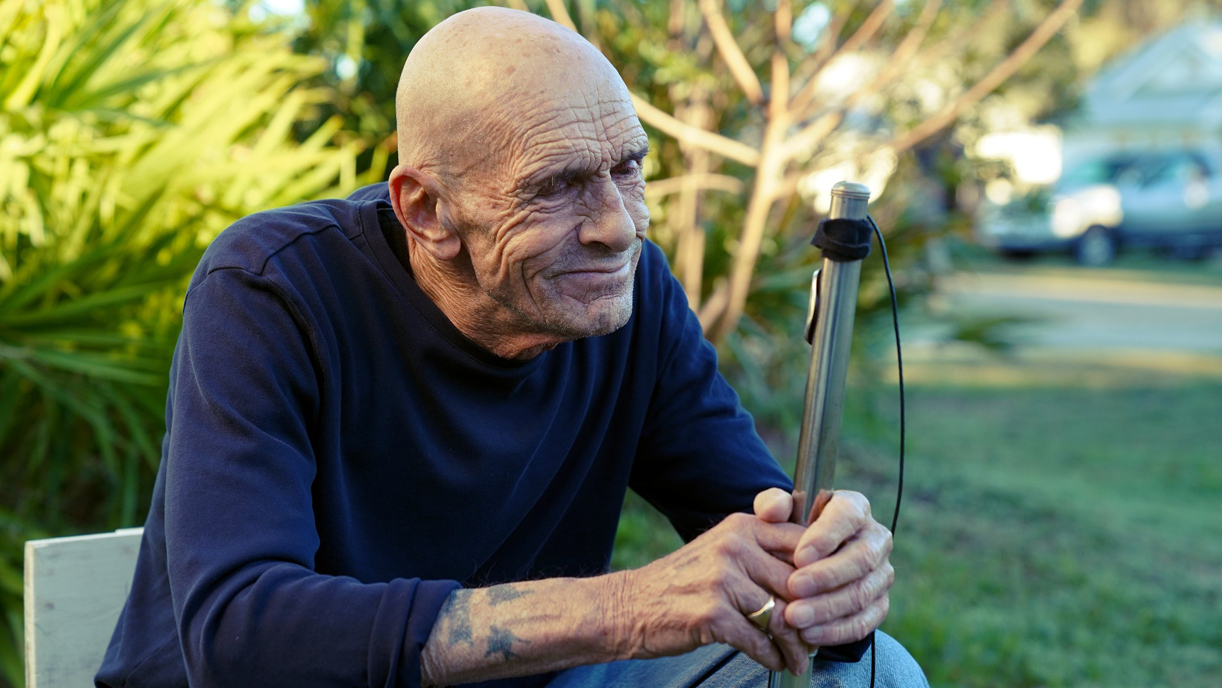
POSTSCRIPT : In recent months Danny Wilding has most certainly been dealing with extreme adversity. There is a new GoFundMe page where you may help him in these difficult times : Danny Wilding GoFundMe
###
All photos are copyright their respective owners.
Table Of Contents
Contact







